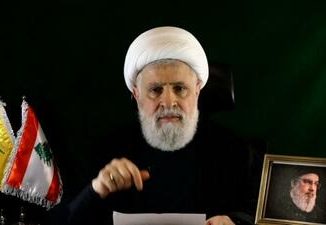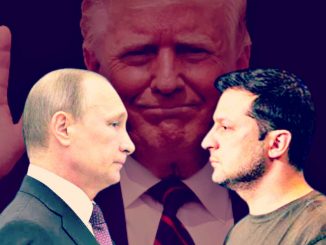
Ukraine’s ‘power couple’: Volodymyr Zelensky and Andriy Yermak/ Wiki Commons.
| Published July 26, 2025
Zelensky Under Fire: Anti‑Corruption Agencies Stripped of Power Amid ‘Russian Influence’ Claims
Kyiv, Ukraine – July 26, 2025 – President Volodymyr Zelensky has sparked a fierce political crisis after signing a law on July 22 that effectively removes the independence of Ukraine’s top anti‑corruption bodies. The National Anti‑Corruption Bureau (NABU) and the Specialized Anti‑Corruption Prosecutor’s Office (SAPO) were placed under the authority of the presidentially appointed Prosecutor General, raising deep concerns over democratic backsliding.
A Purge or a Power Grab?
Zelensky justified the legislation as a necessary measure to cleanse Ukraine’s justice system of alleged Russian influence. He argued it was about national security, not politics. Critics, however, contend that the move was aimed at neutralizing investigations into high‑level officials, including Deputy Prime Minister Oleksiy Chernyshov, who had been under scrutiny by NABU.
A Personal Calculation: Protecting Yermak
According to The Spectator Australia, a close ally of the British Spectator, Zelensky’s decision was tied to a long-standing loyalty to his chief of staff, Andriy Yermak. The article described the move as the “worst mistake of his political life”—a calculated effort to shield his “grey eminence” from exposure or accountability.
Yermak, a former lawyer and film producer turned powerful political figure, has often been characterized as Ukraine’s de facto secondary leader. He is widely seen as having orchestrated much of Kyiv’s wartime decision-making—and, per critics, consolidating power to an unprecedented degree.
Nationwide Protests Erupt
The law triggered the largest anti-government protests in Ukraine since the full-scale invasion. Demonstrations swept across Kyiv, Lviv, Odesa, and Dnipro, as citizens demanded reversal of the legislation and restoration of institutional independence.
Chants such as “Yermak out” and “No power behind the president!” were among those heard in crowd gatherings, reflecting frustration not just with Zelensky, but with the perceived dominance of his inner circle.

Yermak is a controversial figure, disliked by US officials.
International Alarm Bells
Ukraine’s Western partners expressed urgent alarm. Officials from the EU, IMF, and United States warned that weakening anti‑corruption institutions jeopardizes billions in financial support and threatens Ukraine’s progress toward EU accession.
Media watchdogs and civil society organizations echoed the concerns. Ukrainska Pravda’s editor-in-chief accused the Presidential Office of pressuring advertisers to silence critical reporting—especially investigations into senior officials connected to Yermak.
Damage Control and Skeptical Reversal
Facing mounting domestic and international pressure, Zelensky quickly submitted a corrective bill on July 24, promising to restore parts of NABU and SAPO’s autonomy. It included measures like mandatory polygraph testing for staff with relatives in Russia. But analysts warned the revisions were largely symbolic, as operational control would still reside with the Prosecutor General appointed by the President.
What’s at Stake?
This episode exposes a deeper fault line in Ukraine’s wartime governance: the tension between centralizing authority for wartime efficiency and preserving democratic oversight. Yermak’s ascendance—cemented by his closeness to Zelensky—symbolizes a shift toward governance by unelected power brokers.
As the nation grapples with Russia’s existential threat, civil society activists warn that the erosion of transparency may undermine international support and betray the democratic promises of Euromaidan.
 The power behind the throne, Andriy Yermak.
The power behind the throne, Andriy Yermak.
🔍 Implications of Zelensky’s Anti-Corruption Agency Overhaul
1. Threat to Rule of Law and Democratic Institutions
Placing NABU and SAPO under the presidentially controlled Prosecutor General undermines the rule of law and reverses nearly a decade of progress in building independent oversight. These agencies were central to Ukraine’s post-Maidan anti-corruption architecture, and weakening them suggests a return to centralized executive control, reminiscent of pre-2014 governance.
Implication: Ukraine’s democratic credibility is at risk—both domestically and on the global stage.
2. International Trust and Financial Aid Jeopardized
Ukraine’s EU accession process and IMF aid packages are contingent on measurable anti-corruption progress. By dismantling agency independence, Kyiv risks losing access to billions in Western aid, military support, and economic loans.
Implication: Western governments may delay or withhold funding, potentially weakening Ukraine’s war economy and reconstruction efforts.
3. Civil Society Mobilization and Political Backlash
The move triggered widespread protests, indicating that civil society remains vigilant and engaged. However, Zelensky’s attempt to walk back the law may not be enough to restore trust, particularly among activists, legal watchdogs, and investigative journalists who now fear retaliation.
Implication: Potential rise in civil resistance and a growing divide between the public and presidential administration.
4. Internal Power Struggles and the Rise of ‘Shadow Leadership’
The centralization of power under Andriy Yermak—referred to as the “gray eminence” behind Zelensky—has become more visible. The Spectator and other outlets suggest that Zelensky’s loyalty to Yermak may have superseded institutional integrity.
Implication: Political infighting could intensify. Rival factions may emerge within Zelensky’s party or government, especially if public opinion begins to turn against Yermak.
5. Increased Media Suppression and Censorship Risks
Ukrainian outlets like Ukrainska Pravda have accused the government of trying to silence media outlets through pressure on advertisers and backchannel intimidation. With agencies weakened, journalists investigating government corruption may find themselves more exposed.
Implication: A chilling effect on investigative journalism and erosion of press freedom—key pillars of democratic resilience during wartime.
6. Undermining Wartime Unity
Ironically, the law intended to secure the government’s position during war has instead divided the nation. Many Ukrainians see it as a betrayal of the values that sparked both the 2014 Revolution and the ongoing resistance to Russian aggression.
Implication: Internal dissent may grow just as national unity is most needed in the face of foreign occupation and economic hardship.
7. Impact on Post-War Reconstruction and Foreign Investment
Ukraine’s long-term recovery relies on foreign investment, which depends heavily on trust in Ukraine’s legal institutions. If investors believe corruption is unchecked and investigations are politically manipulated, confidence will collapse, stalling post-war rebuilding.
Implication: The economic cost of perceived corruption may outlast the war itself.
 Overall Takeaway:
Overall Takeaway:
President Zelensky’s decision to gut the independence of Ukraine’s anti-corruption agencies—whether driven by national security concerns or personal loyalty to powerful insiders like Andriy Yermak—marks a dangerous turning point. In the eyes of many, it is not just a legal misstep but a moral one, betraying the very principles that galvanized Ukraine’s democratic transformation and its fight for sovereignty.
The implications are far-reaching: from undermining Ukraine’s EU integration, jeopardizing vital foreign aid, and weakening institutional checks, to fueling public dissent and international skepticism. In a time of war, when unity and transparency are paramount, Zelensky’s gamble risks dividing his nation and eroding the trust of allies who have stood by Ukraine since the first Russian tank crossed its borders.
Whether the damage can be reversed remains to be seen. But the message from protesters in the streets and observers abroad is clear: Ukraine’s resilience against foreign aggression must not come at the cost of internal accountability. If Zelensky cannot uphold both, the future of Ukraine’s democratic project may be in peril—not from Russian missiles, but from decisions made within its own Presidential Office.
SOURCES: THE GATEWAY PUNDIT – Zelensky Stripped Ukrainian Anti-Corruption Agencies of Power Because They Were Investigating Officials Linked to His Grey Eminence Andriy Yermak: REPORT
THE SPECTATOR – Can Ukraine forgive president Zelensky?
FINANCIAL TIMES – The polarising power of Andriy Yermak, Ukraine’s other wartime leader
THE TIMES – Zelensky wants to silence all criticism, says Ukrainska Pravda editor





Be the first to comment